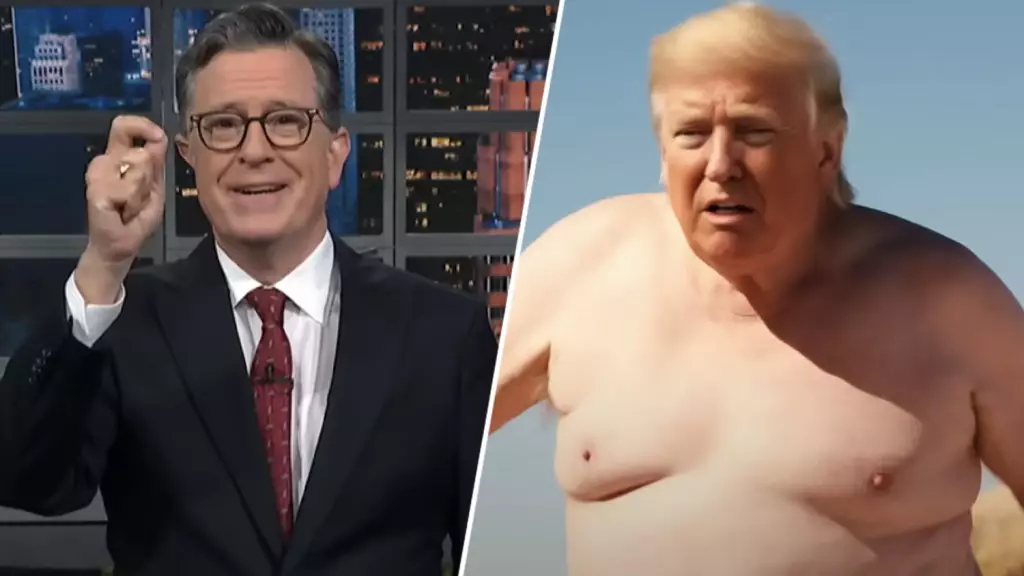In an era where political discourse often devolves into polarized shouting matches, entertainment media—particularly satire—emerges as a vital force for societal reflection and critique. South Park’s recent skirmish with Donald Trump underscores the potency of irreverent humor not merely to entertain but to challenge powerful figures and influence public perception. This isn’t just about laughs; it’s about holding the mighty accountable when traditional channels fall short. By cartooning Trump into absurd scenarios, the creators of South Park amplify a broader message: satire isn’t just comedic relief; it’s a form of resistance, a cultural pulse check that prevents authoritarian complacency from taking hold.
What’s significant about the show’s recent episode is its unapologetic willingness to push boundaries. Featuring a Twitter-sized PSA where Trump’s body parts are mercilessly mocked—via a deepfake constructed scene that feeds into the controversy surrounding AI-generated content—South Park boldly underscores the dangerous flirtation with deregulated AI. It’s a clever strategy: mockery becomes a shield and a sword, weaponizing humor to highlight societal vulnerabilities. The episode’s sharp critique of preferential treatment towards Trump reveals not just bias but a broader concern about the delegitimization of democratic norms under a presidency that openly mocks institutional checks and balances.
Media, Power, and the Silence of Suppression
Meanwhile, Stephen Colbert’s response signals how mainstream media figures are grappling with their own vulnerability in this often hostile political environment. His playful insertion of a QR code linking to the South Park scene illustrates a shift toward direct digital activism—combining humor with technology to bypass institutional censorship or corporate limitations. Colbert’s apparent optimism hinges on a recognition that satire, especially when wielded online, can foster hope and resistance. It’s an acknowledgment that humor, when wielded effectively, has the capacity to rally dissent, challenge narratives, and empower audiences to think critically about the power structures in place.
But there is an underlying tension. Colbert’s mock endorsement of the deepfake scene isn’t just about entertainment; it’s about asserting the importance of unrestrained creative expression in an age of AI-enhanced misinformation. His joke hints at a paradox where deregulation, often justified as promoting innovation, might enable the proliferation of grotesque fake content—content that can distort reality and undermine truth. Still, Colbert’s tone suggests a belief that humor creates a space for dialogue, even amid controversy. It’s a reminder that satire is an act of defiance, a tool that confronts the veneer of political propriety and exposes the absurdity lurking beneath.
Incriminate and Instruct: Satire’s Blunt Truth-Telling
South Park’s zany critique of Trump’s antics—ranging from comedic depravity to serious political accusations—serves as a mirror to the broader societal obsession with spectacle and scandal. The episode’s inclusion of a PSA with vulgar humor, combined with references to legal disputes, cancel culture, and bizarre personal claims from the president, demonstrates how satire intertwines humor with a scathing critique of hypocrisy and power. It’s not merely about lampooning a leader but about revealing how political figures manipulate media, throw blame, and distort truth to maintain control.
However, the controversy surrounding the show’s depiction of Trump and the broader implications of deregulating AI introduce a necessary debate: Should satire be protected, or does it threaten societal stability? The line is blurry. Yet, it’s crucial to recognize that satire’s role is to unsettle complacency, challenge authority, and serve as a creative check on authoritarian tendencies. If anything, the episode and Colbert’s commentary reveal a collective realization that the freedom to mock and critique is fundamental to preserving democratic integrity.
Power, Patronage, and the Cultural Battleground
The ongoing narrative also exposes the symbiotic relationship between entertainment corporations and political power. As Parker and Stone secure new deals with Paramount, it’s clear that even the most subversive humor operates within a complex web of corporate interests, legal protections, and cultural influence. The timing of the show’s episode—just after the network’s controversial settlement involving Trump—raises questions: Are corporations genuinely committed to free speech and cultural critique, or are they maneuvering to preserve their market position amid scandals and political scrutiny?
Furthermore, Trump’s reaction—celebrating Colbert’s comedy as a sign of victory—reveals how satire can unsettle even the most entrenched figures. It also highlights the importance of a resilient culture of humor that refuses to capitulate under pressure. Satire might not change policies overnight, but it shapes the collective mindset—encouraging skepticism of powerful narratives and fostering resilience against manipulation.
Ultimately, this turbulent landscape proves that humor, especially when sharpened by purpose and a critical edge, is far more than entertainment. It’s a strategic weapon in defending democracy, a mirror reflecting society’s hypocrisies, and a voice for the marginalized. When wielded responsibly, satire can be a formidable force that pushes us to confront uncomfortable truths and inspires courage in times of chaos.

